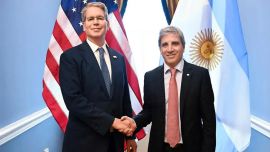On the economic front, 2018 is ending badly, what with stock markets bungee-jumping, interest rates rising and edgy forecasters telling us some big storms are coming our way. This is why Argentina’s” country risk index” is one of the world’s highest; outside experts expect her to sink beneath the waves. Making the outlook for 2019 darker are fears that the wars ravaging the Middle East could soon get even bloodier than they have been so far.
As tends to happen these days, many blame the allegedly “most powerful man in the world,” US President Donald Trump, for bringing all this about. They have a point. In addition to accusing the Fed of trying to slow down the boom he takes such pride in, and shutting down some government departments until he gets money for “the wall, fence, or whatever you want to call it” he is determined to build along the border with Mexico, Trump has just made it clear that he wants to withdraw troops from Syria and Afghanistan, a policy that – until he adopted it – was favoured by many of his progressive compatriots.
Though these have typecast Trump as a rabid right-winger, he has a lot in common with leftists who think the US government should leave Middle Easterners and others to their own devices and concentrate on making life better for the folk back home. He is certainly no imperialist. Along with large numbers of his fellow North Americans, he rejects the idea that great power brings with it great responsibility. Unlike the British – when they lorded it over much of the rest of humanity – or the French, they do not believe it is their country’s duty to rule others so they too can enjoy the blessings of what most presumably believe is a superior civilisation. Trump’s way of thinking is shared by most members of the US establishment who, whether progressive or conservative, cling to the notion that, by freeing themselves from the British yoke, their forerunners began the worldwide rebellion against imperialism; they greatly dislike being told by Latin Americans that they are the most imperialistic of the lot.
Unabashed Western imperialism died when, weakened by war, the two countries most associated with it, the United Kingdom and France, realised that the costs of administering large tracts of Asia and Africa greatly outweighed the benefits. For hundreds of millions of people, the decision to pull out of the territories they had dominated would have terrible consequences. Most former imperial possessions quickly degenerated into failed states in which troublesome minorities got massacred and individuals associated with the government got fabulously rich. There were some exceptions, such as India where, after partition in which over a million were killed and 15 million displaced, order was eventually re-established, but in dozens of other post-colonial countries the outcome could hardly have been worse.
By unexpectedly ordering the withdrawal of the few US troops in Syria, thereby signalling the imminent end of the “Pax Americana” that had kept large swathes of the planet fairly quiet in the decades following World War II, Trump dismayed the Kurds and delighted their worst enemy, Turkey’s thuggish Islamist ruler Recep Tayyip Erdogan, who wants to kill as many of them as possible.
He also worried the Israelis and Saudis who, like many others before them, have just been reminded that it is always a mistake to rely overmuch on the US, a country that has traditionally been averse to foreign entanglements and, in any case, tends to be governed by people with a short attention span. As for Afghanistan, for years it has been plain that, a few minutes after the departure of the NATO troops, the Taliban will retake power and go about butchering the many they regard as infidels or were foolish enough to work for the US or its European allies.
Trump’s slogan “America first” would matter less if the Europeans were in a position to play the role of “globocop.” But, after living in what was a US protectorate for over 70 years, a period in which they managed to persuade themselves that hard power is brutish and should be replaced by loving kindness and a willingness to nice to people who boast of their willingness to make them pay for their ancestors’ many sins, they are no longer capable of doing much more than wringing their hands and blaming themselves for the terrible things that are happening in the “Greater Middle East,” Africa and other parts of the world. Some well-meaning souls insist Europe should let in some of the perpetrators of the worst horrors so they can be taught the value of diversity.
Imperialism may be as bad as all right-thinking people say it is, but seeking power over others is a universal human trait. When a hegemon beats a retreat, either because it is too weak to continue or because, like some North Americans and most Chinese and Japanese, its rulers think foreign influences are undermining the national spirit, the resulting turmoil can reach truly terrible proportions, as it did when the Roman Empire and others in Asia fell apart.
In order to defend themselves, those countries that can will become more authoritarian. Others, and there are many of them, will be turned into slaughterhouses in which murderous factions, some of them “proxies” for outsiders, fight for supremacy, as they are currently doing in Syria and Yemen.
This will go on until a single power, or an ad hoc coalition, manages to assert itself and fill the vacuum. Unless the US changes its collective mind in the near future and decides that it is in its interest to resume playing the thankless role of world policeman, the favourite candidate for the job will be China which, unlike Vladimir Putin’s Russia, could soon acquire the necessary means.
Although an international order dominated by China would be better than anarchy, it would be galling for those who think all countries, even the tiniest and most primitive, should be treated as equals. Unlike the North Americans, who at least paid lip-service to that idealistic principle, for millennia members of the Chinese elite have taken a hierarchical view of the world in which they occupy the centre and, if in a kindly mood, allow the surrounding barbarians to pay them tribute. This is unlikely to change.




















Comments